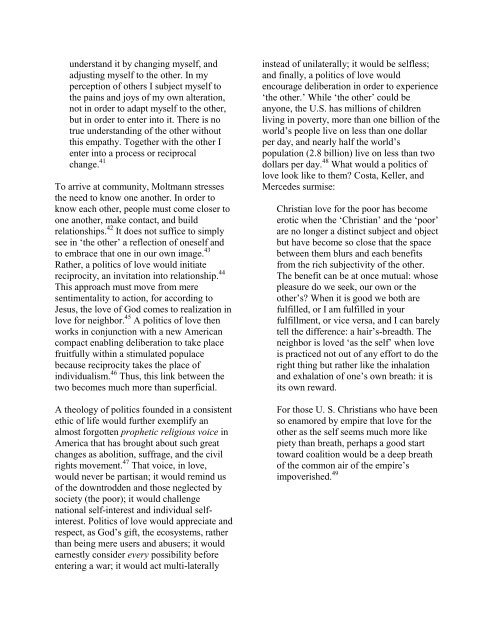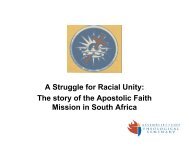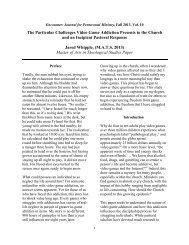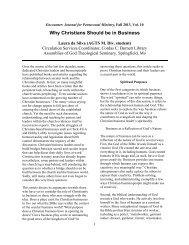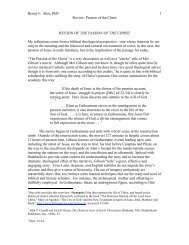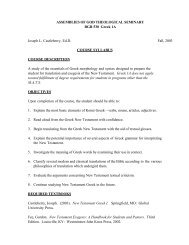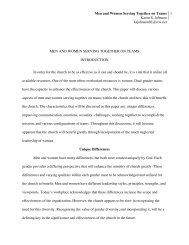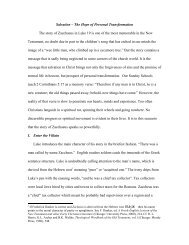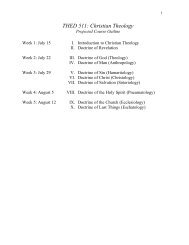Encounter: Journal for Pentecostal Ministry - Assemblies of God ...
Encounter: Journal for Pentecostal Ministry - Assemblies of God ...
Encounter: Journal for Pentecostal Ministry - Assemblies of God ...
You also want an ePaper? Increase the reach of your titles
YUMPU automatically turns print PDFs into web optimized ePapers that Google loves.
understand it by changing myself, and<br />
adjusting myself to the other. In my<br />
perception <strong>of</strong> others I subject myself to<br />
the pains and joys <strong>of</strong> my own alteration,<br />
not in order to adapt myself to the other,<br />
but in order to enter into it. There is no<br />
true understanding <strong>of</strong> the other without<br />
this empathy. Together with the other I<br />
enter into a process or reciprocal<br />
change. 41<br />
To arrive at community, Moltmann stresses<br />
the need to know one another. In order to<br />
know each other, people must come closer to<br />
one another, make contact, and build<br />
relationships. 42 It does not suffice to simply<br />
see in „the other‟ a reflection <strong>of</strong> oneself and<br />
to embrace that one in our own image. 43<br />
Rather, a politics <strong>of</strong> love would initiate<br />
reciprocity, an invitation into relationship. 44<br />
This approach must move from mere<br />
sentimentality to action, <strong>for</strong> according to<br />
Jesus, the love <strong>of</strong> <strong>God</strong> comes to realization in<br />
love <strong>for</strong> neighbor. 45 A politics <strong>of</strong> love then<br />
works in conjunction with a new American<br />
compact enabling deliberation to take place<br />
fruitfully within a stimulated populace<br />
because reciprocity takes the place <strong>of</strong><br />
individualism. 46 Thus, this link between the<br />
two becomes much more than superficial.<br />
A theology <strong>of</strong> politics founded in a consistent<br />
ethic <strong>of</strong> life would further exemplify an<br />
almost <strong>for</strong>gotten prophetic religious voice in<br />
America that has brought about such great<br />
changes as abolition, suffrage, and the civil<br />
rights movement. 47 That voice, in love,<br />
would never be partisan; it would remind us<br />
<strong>of</strong> the downtrodden and those neglected by<br />
society (the poor); it would challenge<br />
national self-interest and individual selfinterest.<br />
Politics <strong>of</strong> love would appreciate and<br />
respect, as <strong>God</strong>‟s gift, the ecosystems, rather<br />
than being mere users and abusers; it would<br />
earnestly consider every possibility be<strong>for</strong>e<br />
entering a war; it would act multi-laterally<br />
instead <strong>of</strong> unilaterally; it would be selfless;<br />
and finally, a politics <strong>of</strong> love would<br />
encourage deliberation in order to experience<br />
„the other.‟ While „the other‟ could be<br />
anyone, the U.S. has millions <strong>of</strong> children<br />
living in poverty, more than one billion <strong>of</strong> the<br />
world‟s people live on less than one dollar<br />
per day, and nearly half the world‟s<br />
population (2.8 billion) live on less than two<br />
dollars per day. 48 What would a politics <strong>of</strong><br />
love look like to them? Costa, Keller, and<br />
Mercedes surmise:<br />
Christian love <strong>for</strong> the poor has become<br />
erotic when the „Christian‟ and the „poor‟<br />
are no longer a distinct subject and object<br />
but have become so close that the space<br />
between them blurs and each benefits<br />
from the rich subjectivity <strong>of</strong> the other.<br />
The benefit can be at once mutual: whose<br />
pleasure do we seek, our own or the<br />
other‟s? When it is good we both are<br />
fulfilled, or I am fulfilled in your<br />
fulfillment, or vice versa, and I can barely<br />
tell the difference: a hair‟s-breadth. The<br />
neighbor is loved „as the self‟ when love<br />
is practiced not out <strong>of</strong> any ef<strong>for</strong>t to do the<br />
right thing but rather like the inhalation<br />
and exhalation <strong>of</strong> one‟s own breath: it is<br />
its own reward.<br />
For those U. S. Christians who have been<br />
so enamored by empire that love <strong>for</strong> the<br />
other as the self seems much more like<br />
piety than breath, perhaps a good start<br />
toward coalition would be a deep breath<br />
<strong>of</strong> the common air <strong>of</strong> the empire‟s<br />
impoverished. 49


